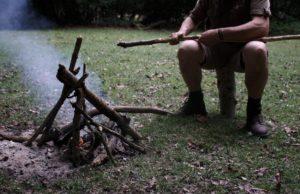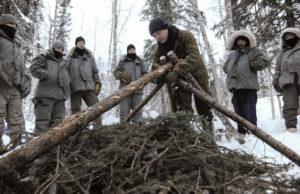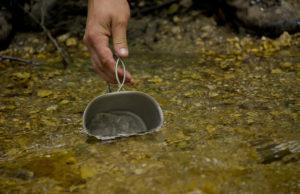When a child takes their first steps as a scout, they learn important lessons of survival and preparation. It’s part of the scout motto and for good reason too. You can’t expect a 10-year-old boy to survive in the woods alone, but you can expect him to at least be prepared and know the basics.
Being prepared to survive in the wild, or even in an urban environment is no easy task. There are a lot of elements to consider when learning about survival and when the sh-t hits the fan, most of that information is lost or forgotten when the panic and stress kicks in.
When that sh-t hits the fan, the prepping you have done will be the reason you survive. This is why prepping is the most important part of survival.
There are three ways you can prepare yourself and your family for survival:
- Growing your knowledge and skills
- Mental and physical prepping
- Prepping a survival pack
What is survival and how is it different from prepping?
Prepping is everything you can do to ready yourself for survival. This can be from stocking food, living off-the-grid, taking self-defense classes or undergoing stress-induced training. It is all so that when the survival clock starts ticking, you are able to do what must be done.
Most people have prepped in some manner for survival. If you have a first-aid kit in the car or at home, you have successfully prepped to survive a minor injury or wound.
So let’s talk about the basics you need to start doing to survive. We can split these up using those three ways to prep for survival that were mentioned above.
Growing your survival knowledge and skills
Basic skills in survival can be split into two different groups. The first is emergency surviving in the wild, the second is surviving in a sh-t hits the fan worst-case scenario event.
You have probably seen a number of stories and movies to do with survival in the wild. This is very basic survival but also
has a lot of intricate areas. In a scenario such as this, our primary problems are:
- Thirst
- Hunger
- Climate
- Terrain
- Physical and mental health
These are the problems that will kill you in the wild. It should be at the top of your list of skills that need to be learnt. The knowledge you can attain and the skills you can learn are free thanks to the internet and the vast survival and prepping community.
Say you are trapped on an island with nothing but your bare hands and a strong mind. We have all heard of this scenario before and as a fun activity with friends we can sit around the table after dinner and draw up lists of things we’d need to survive and what we’d do to survive until help came.
Remove the brainstorming from friends, the comfort of having just eaten a nice dinner and throw yourself into the wild. You’re stressed, suffering from shock, panicking and you’re without a phone to search on the internet for answers. The sh-t has hit the fan.
On top of that, we have a timeframe as well. For the average person, it goes like this:
- You can survive 3 minutes without air.
- You can survive 3 hours without shelter.
- You can survive 3 days without water.
- You can survive 3 weeks without food.
- You can survive 3 months without security.
When we look at prepping, survival is a core part of what we need to know. If you can manage to have a rough idea of how you would survive on an island with nothing then you will be even more prepared to survive anything less than that.
The key behind island survival knowledge is this: the more you know, the less equipment you need. Heck, even if you need toilet paper out in the wild you can collect moss from stones, wash it, dry it and use it. That’s basic survival.
But this is very bare ‘in the wild’ survival. The skills and knowledge you need to prepare yourself for you and your family to survive a worst-case scenario event such as a social outbreak, financial collapse or nuclear war are quite detailed. You may need to learn financial management, how to shoot, or how to purify water and harness solar power. These are survival skills which are just as important as tying different types of knots or finding food.
Next is another important skill for survival – mental and physical preparation.
Mental and physical health for survival
They call emergency events or when sh-t hits the fan scenarios simply that because they induce stress and cause panic. When things go south natural instinct kicks in and cause the flight or fight mode to take over.

This type of response takes control of the natural reaction most people have in those circumstances and allows you to operate under pressure. This is why soldiers undergo rigorous training and why experienced surgeons remain calm in emergencies. It is very difficult to train your mindset to work like this without taking part in training.
Preparing yourself with a healthy exercise regime builds both mental strength and physical endurance. It’s also free to do. When you are in survival mode your fitness will have a direct correlation with resistance to stress, insanity, thought processes and your general ability to help yourself and others.
Last, and this is also a very important part, is prepping your own survival gear. Some of this can be made at home and some can be purchased online.
Prepping your own survival pack
Surviving is made easier with innovations in the industry that you can get right now. You might be wondering why you would buy stuff like this but when it comes to survival for you and your family, nothing else is more important.
The first thing to realise is if you are caught in the wild, you are probably not going to have a bag of goodies to help you survive. But at the very least, you should always have a backup bag just like you have a first-aid kit in the car or at home.
There are two things you need to prep. The first is a bug-out bag. Bug out is a military term which refers to having to

For any given situation, a survival bag should contain the contents to support you for the first 72 hours. In my experience
in the military, I first started using 5.11 products for durability and versatility. My favourite is my 72-hour rush backpack. This is the one bag I have used to supplement short field trips, and I have kept using it post-military outdoors and in urban environments.
That’s the bag itself. As for the contents, you will find more detailed explanations on The Prepping Guide but you will need to include essentials of the following:
- Water containers and purifiers (like the Lifestraw)
- Food bars, meals and cooking devices
- Clothing – shoes are the most important and an all-purpose jacket
- Shelter – including a sleeping bag or foil heat cover
- Heat – fire flint and fire accelerants
- Medical – must have
- Tools – pocket knife and larger sturdy knife for cutting and chopping
- Lighting – headlamps and filtered torches
- Communications
- Travel related items such as maps and money
- Self-defence item
- And other miscellaneous tools and items
The second thing is a smaller prep kit. This is something you can carry in the car or anywhere else for that matter. It is something you should carry with you at all times. This will contain the absolute necessaries to help you.
You could fit all of this in a tin or a small bag. First, I would recommend one of those multi purpose paracord bands with a flint. In your mini bug out kit you should have:
- Small foldable knife
- Rescue whistle
- Mini-compass
- Needle and threat
- Fishing line with 3 hooks and 3 sinkers
- Can opener
- A few different bandages
- Waterproof matches
- Signal mirror
- Some silver thick tape around the match container
- LED light
- Water tablets
All of these things have so many purposes to assist you with gathering food, water, working with fire and signalling for help. With a tin like this, you can also use the leftover supplies to make more for friends who you think might need it.
When you’re looking to survive a worst-case scenario, the list building becomes a lot more important as you are going to need to look at storing at least three months of food, water and then more. You will find a lot of these resources in The Prepping Guide.
Survival is about community, family and knowledge
That’s right. You need a community, friends and family if you really want to survive. You share knowledge with a community and ways to approach survival and prepping. The Prepping Guide is just one part of the much larger prepping
You can also become part of scouting groups, if you have kids get them involved too. There are camping groups, mountain hiking groups, corporate financial prepping groups, self-sufficient gardening groups and even solar cooking clubs. All of these communities work towards prepping and survival in their own way and are a valuable source of peer-to-peer knowledge. The other side to it that these communities make prepping fun, they are full of like-minded people who enjoy the outdoors or strategic thinking and planning ahead. Besides, you may as well enjoy yourself while you are prepping.
Survival is also about family. People prep to keep themselves and their family safe. After all, who would want to be on their own if there was ever a fallout? Monopoly does not have a single-player mode.
When it comes down to it, when the sh-t hits the fan, I would want my family to be safe, warm and happy while playing Monopoly. Wouldn’t you?



looked up that 5 11 bag, second review detailed why it’s junk.
ll go with experience there.
Way too much money for less quality.
I have been abusing the heck out of the 5.11 RUSH 24 for a little less than a year now, and it just keeps on trucking. My first real outting with it was an over-nighter, and I had it weighing about 35 pounds (I had added 6 pouches to it, some small, for paracord and dental hygiene items, and some larger for general purpose). I didn’t need that much stuff for 2 days, but I wanted to test her out realistically. And she held. And was quite comfortable on the 5 miles out and 5 back. Granted, I was carrying a fair bit of water, so the weight only went down. I had put on a waist strap that I saved from an old POS bag I had years ago, and this certainly helped with comfort. I picked up the RUSH 12 for my lady not that long ago, and she really loves it. Yes, 5.11 is not the best backpack manufacturer out there, but I do believe that their packs are worth the quatloos. I would definitely trust the 24 and 12 in a bug out/survival situation, unless it was winter and I had to carry a tent and a fair bit of extra clothing and items.
A bugout bag without a plan is not much of a bugout at all. Have multiple contingencies on where to go. Preset rally points in all applicable directions, and multiple routes to get to your bugout location.